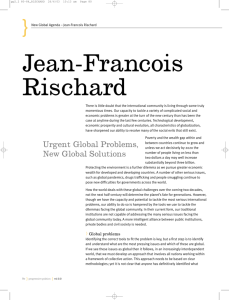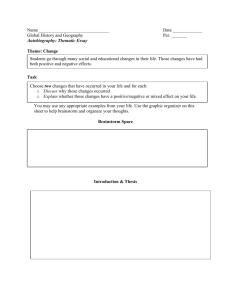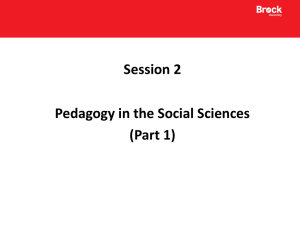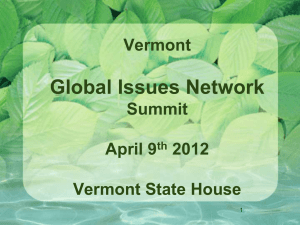NCSS 2010 PowerPoint Presentation
advertisement
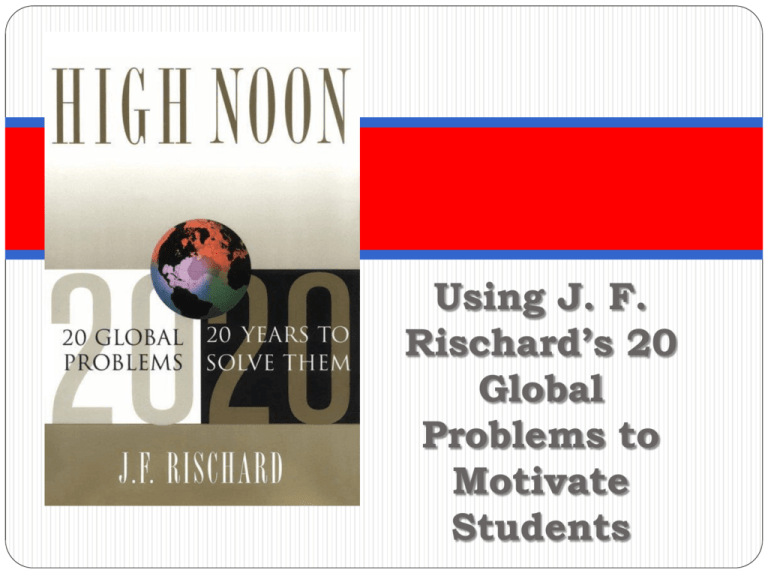
Using J. F. Rischard’s 20 Global Problems to Motivate Students Homeland Sitka High School Jody Smothers –Marcello Global Issues, AP Human Geography, World History, American History, Women’s History, and English Editor, The Geography Teacher (NCGE) National Board Certified Teacher University of Alaska Southeast MAT Program smothers-marcelloj@mail.ssd.k12.ak.us http://www.newsweek.com/2010/10/08/water-shortages-map.html Newsweek: “The New Oil.” October 8, 2010. By Jeneen Interlandi. Goal This global issues course uses geographic inquiry and J.F. Rischard's 20 global problems as foci. Examine student learning and global citizenship awareness growth from initial inquiries to final products. Specifically……….. (1) Demonstrate the importance and utilization of geographic inquiry as a framework for student study and learning in global issues in the 21st century, especially as it relates to spatial learning (2) Review J. R. Rischard’s High Noon: 20 Global Issues and 20 Years to Solve Them book as a classroom resource accessible by students with a range of reading abilities (3) Engage participants in how to frame and manage student learning in an inquiry format (4) Discuss the importance of using student inquiry as a method for building global citizenship awareness Assessment How can we get Thinking like an assessor students at the (Wiggins) achievement Geographic skills levels they (Geography for Life) need AND create an Scoring guide (Smothersunderstanding Marcello) of what it Students: higher level means to think thinking skills geographically or spatially Parents and critically? Policy makers Public Book & inspiration Who can really solve global problems or issues? J. F. Rischard High Noon book Global Issues Networks Implementation What school structures support this project? Block schedule: every other day, alternate Mondays (+lab & office hours) All seniors: all academic or achievement levels Supportive librarian Access to technology Blog SE AK Travel Schedule Implementation What curricular and instructional decisions support this project? Standards-based Scoring guide Ownership of issues Structures for success and build to success Public recognition Schedule How do we go from the beginning to the end of the semester? Brainstorm issues: includes categories Choices & reading selections Issues & Controversies (Facts on File) 3 articles Maps Videos Books Presentation Forum (Questions on Blog) Brainstorm What are the top 20 global issues? GLOBAL ISSUES BRAINSTORM Rischard’s 20 Sharing our planet: issues involving the global commons Global warming Biodiversity & ecosystem losses Fisheries depletion Deforestation Water deficits Maritime safety & pollution Sharing our rule book: issues needing a global regulatory approach Reinventing Sharing our humanity: issues requiring a global commitment Fight against poverty Peacekeeping, conflict prevention, combating terrorism Education for all Global infectious diseases Digital divide Natural disaster prevention & mitigation taxation for the 21st century Biotechnology rules Global financial architecture Illegal drugs Trade, investment, & competition rules Intellectual property rights E-commerce rules International labor & mitigation rules Book List How do we go from the beginning to the end of the semester? The World Is Flat & Hot, Flat, and Crowded (Friedman) The Blue Covenant (Barlow) & When the Rivers Run Dry (Pearce) Weather Makers (Flannery) Guns, Germs, and Steel (Diamond) The White Man’s Burden (Easterly), The End of Poverty (Sachs), & Dead Aid (Moya) Show-®-World: book recommendations, too! Sample Forum ?s Rischard in High Noon frames global issues under the two umbrellas of demographics and economics. Do you agree with his framework? Why or why not? Do demographics just lead to unprecedented stresses? What are some of the unprecedented stresses and opportunities of the world’s economy? We live in a win-lose world. Even democracy is win-lose. Gary Holthaus says that traditional societies were profoundly democratic and took time to talk through things to solve problems, rather than create a win-lose situation. Who wins and who loses in the way we currently solve problems? Do we want to preserve that way of solving problems, or could we get to win-win solutions? Sample Forum ?s Mae Jamison the former astronaut has spoken about the need for transdisciplinary knowledge in order to solve the world’s problems. Has your education so far enabled you to synthesize the answers to these problems and taught you to think in a transdisciplinary way or is it incumbent upon groups of individuals, holed up and thinking together to make that happen? Can we make it happen in our world of differences? In his book The Empathic Civilization, author Jeremy Rifkin argues that “Humanity finds itself on the cusp of its greatest experiment to date: refashioning human consciousness so that human beings can mutually live and flourish in the new globalizing society…” Can we do it? What will make it possible? Highlights Population Rischard: demographic explosion Activities from Population Connection and Facing the Future One Billion and Counting from Human Geography in Action Geopolitics Russian Empire Georgia, Ukraine, Iran Economic Development Yali’s ? in Guns, Germs, and Steel Collapse demographic Moya, Easterly, Sachs debate Climate Change Facing the Future: Climate Change What else is going on?
